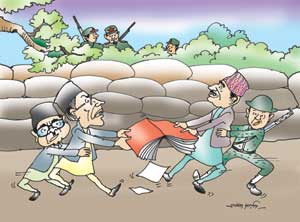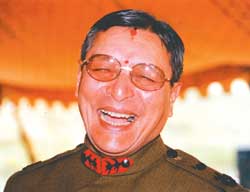 What is surprising about the hoo-hah that followed Chief S'ab Gen Prajwala SJB Rana's speech last week is that it died down so quickly. Pushing the envelope seems to be the Chief's forte, and he gets away with it.
What is surprising about the hoo-hah that followed Chief S'ab Gen Prajwala SJB Rana's speech last week is that it died down so quickly. Pushing the envelope seems to be the Chief's forte, and he gets away with it.
Remember his comments after the Naryanhiti Massacre last year, when he asserted that protecting the life of the Supreme Commander was not the responsibility of the Royal Nepal Army, thereby refuting his own argument by making it. Soon after, he said an all-party consensus was necessary to mobilise the army to fight the insurgency. This riled the politicians again because according to the laws of the land, the army is not a constitutionally-mandated institution but merely an instrument of the executive.
The Commander-in-Chief does have direct access to the decision-making process by virtue of his membership in the National Defence Council, but other than that the constitution gives him the primary function of "not to question why".
But we all know things are not as clear-cut as all that, and the chain-of-command has some hangovers from the past. Gen Rana's latest salvo from Tokha on 27 March was a series of well-aimed mortar rounds directed at the political leadership of the country (see "Who brought the nation to its present condition?", #87). The remarks were couched in a series of rhetorical questions, the most inflammatory of them being: "Is it right to blame the Royal Nepal Army, the protector of national security, for a situation which is the result of 12 years of political factors?"
It must have been a lawyer who wrote that speech. And the chief appeared to be giving vent to his own frustration that the insurgency is proving to be more difficult to fight than expected. But it is tragic that the questions (and their corresponding answers) had to come from the chief of a force that has been fighting to protect the political gains of the past 12 years. Rather than a slap on his wrist from parliament, maybe Gen Rana needed an understanding of the difficulties of the job he has at hand. Nevertheless, the general showed he is every bit of a politician as the people he was berating. His "the Royal Nepalese Army will never engage in double talk" would have been funny if it wasn't so serious.
 For an army chief, Gen Rana is a colourful personality. He sports a bright-red tika on his forehead even while in uniform, indulges himself in extended religious ceremonies, and has no hesitation in coming up with trade mark sound-bites to catch the headlines. But the reason his recent outbursts have created a stir in political circles has nothing to do with Rana's popularity with the press. It is not what he says, but how and when he says it that raises the hackles of politicians.
For an army chief, Gen Rana is a colourful personality. He sports a bright-red tika on his forehead even while in uniform, indulges himself in extended religious ceremonies, and has no hesitation in coming up with trade mark sound-bites to catch the headlines. But the reason his recent outbursts have created a stir in political circles has nothing to do with Rana's popularity with the press. It is not what he says, but how and when he says it that raises the hackles of politicians.
Nepal's traditional elite doesn't seem to have come to terms with the realities of democracy. The bahunistic privilengtsia of Nepal refuses to realise that every time it thumbs its nose at "gutter politics", it inadvertently ends up manufacturing one more apology for those who want to subvert the system at the point of a gun.
The mantra of good governance is music to the ears of donors, but an elaboration of the concept to meet the twin challenges of strengthening democracy and building a strong state is yet to emerge. Democracy confers legitimacy to power, but it is of no use if the authority to exercise it is not there. As a former cabinet secretary put it: it's pointless talking about good governance when there is no governance at all.
Part of the problem faced by the polity can be attributed to the reluctance of the instruments of the state, including the Royal Nepal Army, to carrying out the decisions of successive elected governments. The bourgeois blames the political leadership of the country for being thoroughly corrupt. And most of them are indeed guilty of plunder and squandering public trust. However, it is unrealistic to expect to be led by socialist angels when the whole society is in the process of jumping from the frying pan of feudalism directly into the raging fire of unbridled capitalism.
Is Samuel Huntington right, then, when he points out that corruption is inevitable, even necessary, in order to co-opt an emerging political elite into the system of governance? Democracy develops its antidotes as it matures, and the circulation of elite through elections is institutionalised. To question this evolutionary process is to abet those who want to short-circuit the system.
Sociologist Arvinda Das notes that corruption is a way of making space for itself used by the emerging elite in traditional societies. Former bureaucrats can easily wrangle lucrative consultancies on the basis of donor contacts and bash the government that they served so well for the better part of their lives. But there is no way for ministers to survive in a market-led economy other than the way they are doing. The intelligentsia slams the political class no matter what-Pradip Giri is slammed for being principled and losing the election, while Khum Bahadur Khadka is damned for being unprincipled and winning elections with increasing margins. Heads you win, tails they lose.
Sanctimonious sermons and wishful thinking notwithstanding, there is no way corruption is going to disappear overnight. Neither can the genie of "good governance" materialise out of thin air. Meanwhile, a greasy palm that is instrumental in building power stations is still preferable to the bloody hands that blow them up in the name of a revolution. Kathmandu's chatterati better get that straight and learn to spend more time denouncing terrorism than deriding politicians. And as for Chief S'ab, Prime Minister Sher Bahadur Deuba has already given him a well-deserved public tweak. And the Commander in Chief pretended to wince. But my question is: will Kathmandu's power elite ever learn?



